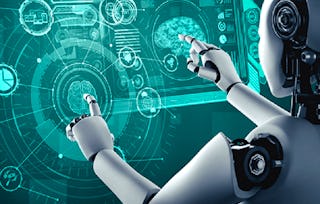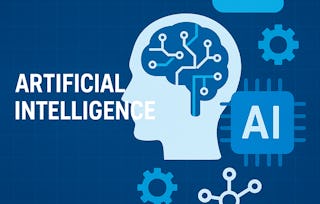In this course, you will delve into the groundbreaking intersection of AI and autonomous systems, including autonomous vehicles and robotics. “AI for Autonomous Vehicles and Robotics” offers a deep exploration of how machine learning (ML) algorithms and techniques are revolutionizing the field of autonomy, enabling vehicles and robots to perceive, learn, and make decisions in dynamic environments. Through a blend of theoretical insights and practical applications, you’ll gain a solid understanding of supervised and unsupervised learning, reinforcement learning, and deep learning. You will delve into ML techniques tailored for perception tasks, such as object detection, segmentation, and tracking, as well as decision-making and control in autonomous systems. You will also explore advanced topics in machine learning for autonomy, including predictive modeling, transfer learning, and domain adaptation. Real-world applications and case studies will provide insights into how machine learning is powering innovations in self-driving cars, drones, and industrial robots. By the course's end, you will be able to leverage ML techniques to advance autonomy in vehicles and robots, driving innovation and shaping the future of autonomous systems engineering.

AI for Autonomous Vehicles and Robotics
Ends soon: Gain next-level skills with Coursera Plus for $199 (regularly $399). Save now.

AI for Autonomous Vehicles and Robotics
This course is part of AI for Mechanical Engineers Specialization

Instructor: Wei Lu
5,230 already enrolled
Included with
(51 reviews)
Recommended experience
What you'll learn
Revise
Skills you'll gain
Details to know

Add to your LinkedIn profile
3 assignments
See how employees at top companies are mastering in-demand skills

Build your subject-matter expertise
- Learn new concepts from industry experts
- Gain a foundational understanding of a subject or tool
- Develop job-relevant skills with hands-on projects
- Earn a shareable career certificate

There are 3 modules in this course
In the first module, we describe several types of robotics and explain key technologies for self-driving cars. We will also explain the application of AI in autonomous systems.
What's included
2 videos4 readings1 assignment
In Module 2, we will review various types of algorithms that are used in robotics and self-driving cars and explain in more detail the principles and functions of key algorithms. We will also examine the applications of algorithms such as reinforcement learning and object detection techniques.
What's included
2 videos2 readings1 assignment1 ungraded lab
In the third Module, we will discuss the following concepts related to robotics: motion planning, perception, and learning. For self-driving cars, we will examine state estimation, localization, and visual perception. Finally, we review the applications of key algorithms such as object detection techniques.
What's included
3 videos6 readings1 assignment1 ungraded lab
Earn a career certificate
Add this credential to your LinkedIn profile, resume, or CV. Share it on social media and in your performance review.
Instructor

Offered by
Explore more from Mechanical Engineering
 Status: Free Trial
Status: Free TrialL&T EduTech
 Status: Preview
Status: PreviewO.P. Jindal Global University
 Status: Free Trial
Status: Free Trial
Why people choose Coursera for their career





Open new doors with Coursera Plus
Unlimited access to 10,000+ world-class courses, hands-on projects, and job-ready certificate programs - all included in your subscription
Advance your career with an online degree
Earn a degree from world-class universities - 100% online
Join over 3,400 global companies that choose Coursera for Business
Upskill your employees to excel in the digital economy
Frequently asked questions
To access the course materials, assignments and to earn a Certificate, you will need to purchase the Certificate experience when you enroll in a course. You can try a Free Trial instead, or apply for Financial Aid. The course may offer 'Full Course, No Certificate' instead. This option lets you see all course materials, submit required assessments, and get a final grade. This also means that you will not be able to purchase a Certificate experience.
When you enroll in the course, you get access to all of the courses in the Specialization, and you earn a certificate when you complete the work. Your electronic Certificate will be added to your Accomplishments page - from there, you can print your Certificate or add it to your LinkedIn profile.
Yes. In select learning programs, you can apply for financial aid or a scholarship if you can’t afford the enrollment fee. If fin aid or scholarship is available for your learning program selection, you’ll find a link to apply on the description page.
More questions
Financial aid available,


